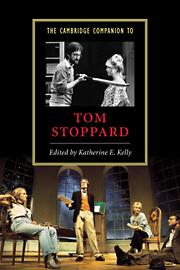Book contents
- Frontmatter
- Chronology
- Introduction
- PART 1 BACKGROUND
- PART 2 THE WORKS
- 3 Narrative difficulties in Lord Malquist and Mr Moon
- 4 Stoppard’s radio and television plays
- 5 Stoppard and film
- 6 The early stage plays
- 7 Travesties, Night and Day, The Real Thing
- 8 Tom Stoppard and politics
- 9 Stoppard’s Shakespeare
- 10 Science in Hapgood and Arcadia
- 11 The comedy of Eros
- PART 3 CULTURE AND CONTEXT
6 - The early stage plays
from PART 2 - THE WORKS
Published online by Cambridge University Press: 28 May 2006
- Frontmatter
- Chronology
- Introduction
- PART 1 BACKGROUND
- PART 2 THE WORKS
- 3 Narrative difficulties in Lord Malquist and Mr Moon
- 4 Stoppard’s radio and television plays
- 5 Stoppard and film
- 6 The early stage plays
- 7 Travesties, Night and Day, The Real Thing
- 8 Tom Stoppard and politics
- 9 Stoppard’s Shakespeare
- 10 Science in Hapgood and Arcadia
- 11 The comedy of Eros
- PART 3 CULTURE AND CONTEXT
Summary
All fine imaginative work is self-conscious and deliberate.
Oscar Wilde, The Critic as ArtistWhen Rosencrantz and Guildenstern Are Dead (R&GAD) opened in New York, an interviewer asked Stoppard what it was about. “It’s about to make me very rich,” came the Wildean (Malquistian?) response. The play had already made Stoppard’s name: Harold Hobson, in the Sunday Times, described the 1967 National Theatre production as “the most important event in the British professional theatre” since the opening of Pinter’s The Birthday Party in 1958. One of the springs of the play is probably Oscar Wilde’s observation in his prison letter De Profundis that the two deracinated courtiers are “little cups that can hold so much and no more,” who, in their dealings with the machiavellian Danish court, find themselves “merely out of their sphere”: a state of terminal bewilderment which, Wilde says, means that genuine tragic status “is really not for such as they.” However, the Wildean influence on Stoppard’s early work goes beyond this specific instance, and is demonstrably at work before Travesties. When the young Stoppard - then a journalist on the Bristol Evening World - had declared himself “a confirmed addict and admirer (literary)” of Wilde, he was acknowledging an affinity we can trace in Stoppard’s emerging aesthetic ideas and dramatic practice. Indeed, the way that Stoppard appropriates Wilde is central to our understanding of his characteristic strengths and weaknesses as a dramatist.
- Type
- Chapter
- Information
- The Cambridge Companion to Tom Stoppard , pp. 104 - 119Publisher: Cambridge University PressPrint publication year: 2001
- 2
- Cited by



